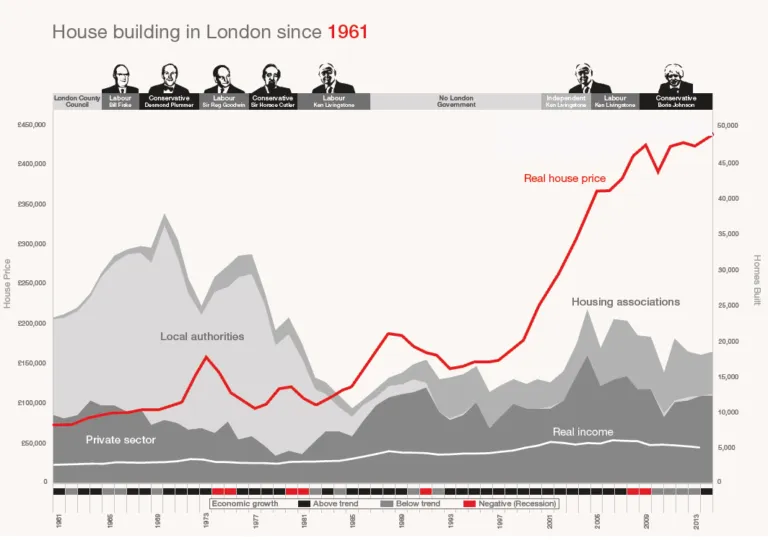Homes for London
Published: by Pete Jefferys
In just 105 days Londoners will take to the polling stations to elect a new Mayor. While the contest itself is not yet top of mind for voters, we can be sure that housing will play a central part in the campaign. It’s by far and away the biggest issue in the minds of Londoners, eclipsing even transport and crime. This is hardly a surprise when the latest stats show that the average house price in the capital is now a mind-boggling £537,000.
| Which of the following do you think are the most important issues facing London at this time? Pick up to three. | |
| Housing | 61% |
| Immigration | 43% |
| Crime | 26% |
| Transport | 26% |
| Health | 21% |
YouGov for Shelter, 1008 London Adults, 18th – 21st November 2015
Back towards the start of the campaign, Shelter set three tests for all the candidates to meet.
Firstly, we want them to show that they have a credible plan to at least double the number of new homes built. Second, they must ensure that many, many more are affordable for low paid Londoners. Finally, the next Mayor will need to get to grips with private renting: making bold, practical reforms to help make renting more affordable, secure and with acceptable conditions.
The candidates are starting to respond. Yesterday, Zac Goldsmith published an Action Plan with key commitments. This included promises to double house building to 50,000 per year by 2020 and to ensure that a significant proportion of new homes are built for rent, as well as homes for sale.
Sadiq Khan has also been very active in developing housing policies, such as a 50 per cent affordable homes target and a new not-for-profit lettings agency to improve private renting.
These pledges all go some way towards meeting the tests we set – which we strongly welcome. We’ll of course need to see proof from both candidates that they have a credible plan to raise house building, including rented homes that low earning Londoners can genuinely afford. As the graph shows, this is a problem that has been accumulating for decades:
Another issue that both candidates have raised is around who gets to buy new market homes that get built. Goldsmith has pledged to ‘give Londoners the first chance to buy new homes built in London’, while Kahn is similarly promising “first dibs” for London first time buyers.
These pledges are clearly tapping into a real concern that Londoners have: after all, there is evidence that 61% of new-build properties bought in London in 2013 were purchased by investors of some sort, rather than people planning to live in them.
But the candidates’ promises here are perhaps a bit more slippery. There’s already an agreement between the Mayor and developers to market homes in London at the same time as selling them overseas. The problem is that this includes homes advertised for sale ‘off plan’ – ie, long before they are actually built. Few Londoners looking for a home to live in can or want to buy a home that doesn’t exist yet, so if the new pledges just mean touting homes to UK based speculators at the same time as overseas speculators then I’m not sure there’ll be much of benefit to priced-out Londoners.
The best way to ensure that new homes are for Londoners first and foremost is to increase the proportion of new homes in affordable tenures. Schemes like shared ownership, social rent and newer ideas like Rent to Buy (low rents to help you save) all have eligibility criteria based on income, local connections and not being an investor.
While the plans from both main candidates are still little more than headline pledges, we welcome the fact that they are focusing on the right issues: genuinely affordable homes and rental reform.
To go further, the candidates need to set out how they will raise house building levels, exactly what sort of affordable homes they will build and how in practical terms they will make renting in the capital more secure, decent and affordable. In particular, there is a lot of distrust about what “affordable housing” really means. A candidate who can take the bold step of linking rents to low pay rates in a clear and consistent way could speak powerfully to a real concern.
With just over 100 days to go, there’s a lot more we want to hear from those hoping to be the next Mayor of London.